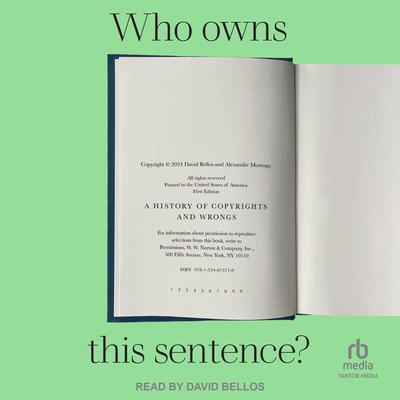Who Owns This Sentence?: A History of Copyrights and Wrongs
By David Bellos and Alexandre Montagu
Read by David Bellos
-
3 Formats: Digital Download
-
3 Formats: CD
-
3 Formats: MP3 CD
-
Regular Price: $19.99
Special Price $15.99
or 1 CreditISBN: 9798855505108
$12.99 With Membership: Learn More -
Regular Price: $49.99
Special Price $32.49
ISBN: 9798874778477
Free shipping on orders over $35In Stock ● Ships in 1-2 days
-
Regular Price: $45.95
Special Price $29.87
ISBN: 9798874778484
Free shipping on orders over $35In Stock ● Ships in 1-2 days
Copyright is everywhere. Your smartphone incorporates thousands of items of intellectual property. Someone owns the reproduction rights to photographs of your dining table. At this very moment, battles are raging over copyright in the output of artificial intelligence programs. Not only books but wallpaper, computer programs, pop songs, cartoon characters, snapshots, and cuddly toys are now deemed to be intellectual properties—making copyright a labyrinthine construction of laws with colorful and often baffling rationales covering almost all products of human creativity. It wasn't always so. Copyright has its roots in eighteenth-century London, where it was first established to limit printers' control of books. But a handful of little-noticed changes in the late twentieth century brought about a new enclosure of the cultural commons, concentrating ownership of immaterial goods in very few hands. Copyright's metastasis can't be understood without knowing its backstory, a long tangle of high ideals, low greed, opportunism, and word-mangling that allowed poems and novels (and now, even ringtones and databases) to be treated as if they were no different from farms and houses. Principled arguments against copyright arose from the start and nearly abolished it in the nineteenth century. Nonetheless, countless revisions have made copyright ever stronger.
Learn More- Only $12.99/month gets you 1 Credit/month
- Cancel anytime
- Hate a book? Then we do too, and we'll exchange it.
Summary
Summary
Copyright is everywhere. Your smartphone incorporates thousands of items of intellectual property. Someone owns the reproduction rights to photographs of your dining table. At this very moment, battles are raging over copyright in the output of artificial intelligence programs. Not only books but wallpaper, computer programs, pop songs, cartoon characters, snapshots, and cuddly toys are now deemed to be intellectual properties—making copyright a labyrinthine construction of laws with colorful and often baffling rationales covering almost all products of human creativity.It wasn't always so. Copyright has its roots in eighteenth-century London, where it was first established to limit printers' control of books. But a handful of little-noticed changes in the late twentieth century brought about a new enclosure of the cultural commons, concentrating ownership of immaterial goods in very few hands. Copyright's metastasis can't be understood without knowing its backstory, a long tangle of high ideals, low greed, opportunism, and word-mangling that allowed poems and novels (and now, even ringtones and databases) to be treated as if they were no different from farms and houses. Principled arguments against copyright arose from the start and nearly abolished it in the nineteenth century. Nonetheless, countless revisions have made copyright ever stronger.
Details
Details
| Available Formats : | Digital Download, CD, MP3 CD |
| Category: | Nonfiction/Law |
| Runtime: | 11.13 |
| Audience: | Adult |
| Language: | English |
To listen to this title you will need our latest app
Due to publishing rights this title requires DRM and can only be listened to in the Downpour app









